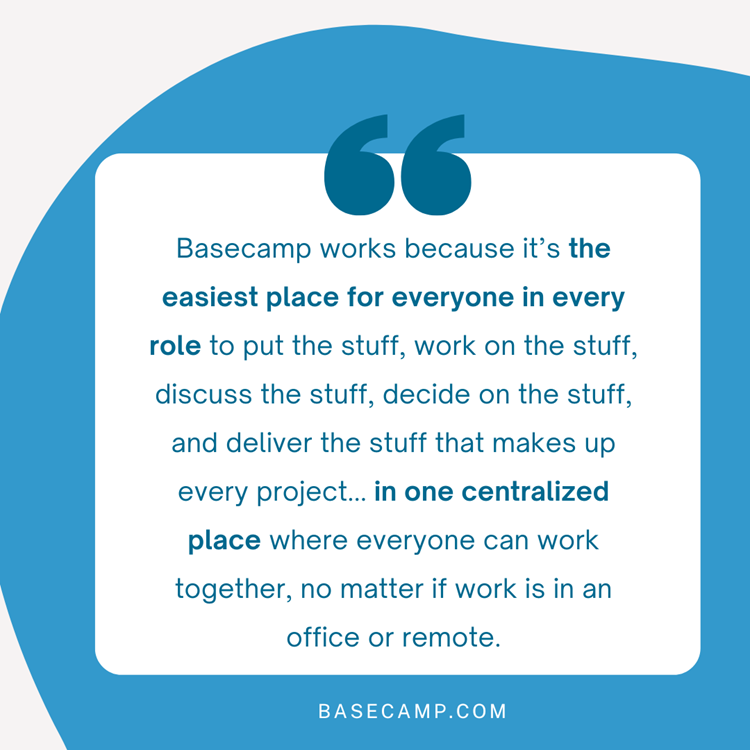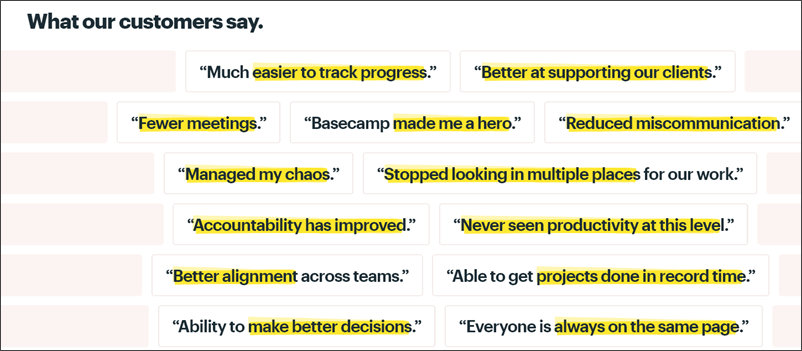
Don’t you love when a blog post or how-to article shares business examples of key points? Anyone can slap up a bunch of rules.
- But how do they work?
- And will they work for your business?
Good business examples nourish clarity and understanding.
Emphasis on the “good”. An example that falls flat detracts rather than helps.
So, how can you write stellar business examples that enhance your content? And can business examples go too far? Well, let me offer a few examples. 😉
TABLE OF CONTENTS
What Makes Stellar Business Examples?
When you are an expert at something, it is easy to forget others are not. However, we seldom have the luxury of knowing the skill level of each reader.
- Some are knowledgeable on the topic.
- Others are topic virgins.
We have to make sense of what we’re communicating on multiple levels. And business examples do that without insulting the knowledge level of those with greater expertise.
Business Examples That Make Sense
Mathematics and I coexist. Math knows I have to work at our relationship but I do recognize Math’s value. Even when I have a hard time figuring that out.
- In college, I took a required Statistics class.
- I struggled with formulas and understanding concepts.
- My study partner created examples from her family’s business to illustrate statistics concepts.
I marveled how easily she did that, but she saved my life in that class. Her real-world examples made sense without hurting my brain. Also, her examples made sense to her statistics-savvy friend she invited to our study group.
Business Examples That Are Believable
Missouri may be known as the “Show-Me” state but today’s social media platforms run a close second when it comes to skepticism.
If you’re attempting to persuade someone, you need a compelling reason for readers to believe you. Notice I did not say “proof”. Customers who believe a company’s claim that its product is “the best” are often those who had a good customer experience.
Below is an excerpt from project management tool, Basecamp’s home page. It explains (in part) what makes its platform special.

Defining its platform as “the easiest place for everyone in every role” is a bold statement. So, how does Basecamp make it believable? If you scan its site you’ll find several strategies for creating a compelling reason to believe the claim.
A “Show-Me” Video
Under the heading – Got 60 Seconds? See How it Works” – Basecamp shares a video on how the tool works. You have to believe in your product to lay it out there for all to see.
The simple, direct overview, all in 60 seconds, supports its claim of “one centralized place” for “stuff’ that is easy for everyone to use.
Testimonials
The site’s use of customer’s feedback (as illustrated below) is short and sweet. One sentence captures the golden nuggets of the review. No long, gushing review that pokes holes in its authenticity.

Relatable Content
Readers are not going to believe what you say if they cannot relate to the topic. Believable business examples, such as those Basecamp offers, include the following methods.
- Define the problem – “stuff scattered everywhere”
- Show how you understand the problem – “Born out of desperate necessity to stop embarrassing ourselves in front of our clients, the story of how Basecamp was born is likely your story, too.”
- Offer a solution – “We focused on building a simple, straightforward collection of tools that could track work so everyone knew who was doing what…”
Additionally, the language used throughout the site makes visitors feel like they’re chatting with a friend. That friendly manner makes it easier for visitors to trust what is delivered. And trust creates believers.
Business examples are the supporting structure to your house of words.
Can Business Writing Examples Go Too Far?
So, business writing examples possess multiple benefits. But can business writing examples cross a line? Can your examples send an unintended message? I think so. Let’s see if you agree.
The following are a few of my line-crossers in business writing examples. My Pollyanna nature prefers a positive approach to business relationships. However, as indicated by earlier comments, you may have a different take on my personal line-crossers.

Line-Crosser #1 – The Public Assassination
A few years ago, I purchased an ebook about professional marketing on LinkedIn. I discovered it through a newsletter from a well-known copywriter who edited the book.
One section of the ebook focused on developing your LinkedIn profile. I began reading the section for new ideas. I quickly felt uncomfortable.
- The author provided examples of “dull headlines” she collected from her connections.
- She listed several with titles and company names.
Surely, they were not specific headlines of her actual connections. Of course, being curious (I prefer that to nosy), I searched for them on LinkedIn.
Sure enough – there they were – with their dull headlines.
Imagine how many other nosy (I mean curious) readers searched for the profiles with the dull headlines. Would you be happy if someone shared your headlines as the poster child for dull?
Positive Spin
A couple of alternative approaches put a positive spin on this “dull headline” tip.
- Use a fictitious name – And tell readers it’s to protect the innocent. 😉 Then, present their original headline and offer examples of better alternatives.
- Get permission – Ask your client if you may use their name. Next, follow the same approach as #1. Present the original – Offer alternatives.
- Omit names – Simply provide examples without names.
Line-Crosser #2 – The Back-Handed Compliment
Offering an example of good business writing is helpful. Examples simplify a point and provide a mini-template for improvement.
However, imagine your response to this individual’s review of another writer’s work.
Despite the choppy delivery, the writer offered a good tip – even if he didn’t follow his own advice.
Are you distracted by the negative bookends to the “good tip”? The reviewer’s back-handed compliment destroys any credibility the tip had as an example of good business writing.
- Readers wonder if the tip is a good one or not.
- And back-handed compliments can boomerang.
- Just how superior does the reviewer think she is?
Positive Spin
Share the tip and if you feel the tip itself is poorly written, revamp your shared version. Or say something like the following.
Although I would have expressed this differently, the tip is a good one to follow.
A back-handed compliment confuses readers. Click To TweetLine-Crosser #3 – The Pat on the Back
You have probably heard the expression ~
Don’t break your arm patting yourself on the back
Have you read pat-on-the-back examples disguised as helpful hints? Like those blog posts or sites where every example is an illustration of the author’s brilliance.
- How I Made Six Figures Last Year
- 7 Reasons I Succeed Online and You Don’t
- How My E-course Made This Writer More Money
Personal success stories are great. However, when badly veiled pats on the back dominate the content, the author may turn off his or her audience.
The headlines may reel in readers at first, but after a while, don’t you wonder if the author is leaking hot air? Or is that the cynic in me? (Yes, even Pollyanna can be a cynic at times).
Possible Alternatives
- Six Figures is Possible – Here’s What Worked for Me
- 7 Proven Tactics that Spell Online Success
- How a Writer Increased Revenue by 30% with the XYZ Course

We love a good example that helps us understand. But, are our examples revealing more than they should?
- Do they make a point at the expense of someone else?
- Are compliments washed away with snide remarks?
- Are we tripping over the self-serving I?
Shining Examples of Writers Who Know How to Do It
The following is a small sample of writers who offer fine business writing examples without crossing over to the dark side.

- Henneke Duistermaat’s Enchanted Marketing site is my go-to resource for great content, chock full of stellar examples.
- Lori Widmer often uses her own experiences on her Words on the Page site for freelance writing resources, but I enjoy the solid examples and never trip over Lori’s ego.
- Sharon Hurley Hall transitioned from online business writing to anti-racism advocacy. Her newsletter is full of examples that make all too clear the immense amount of work we all have yet to do.
Your Turn
Which sites do you enjoy for their helpful examples? What other types of business writing examples have you experienced that go too far? Please share your thoughts in Comments.
Note: The second part of this post – Can Business Writing Examples Go Too Far? originally published on September 16, 2013 and was updated September 25, 2017. I decided to combine these two into one centralized place (like Basecamp). 😉
Credit: BigStock Photo
Credit: Canva
==================================
Helping you keep your business communication simple, clear, and uniquely yours.
==================================

I understand your point, Cathy, but…
What would you do if you searched for the dullards and didn’t find them? Would you believe anything else the author provided? (BTW, even if the names were blanked out, you can still find them on search…)
And, as one who often wonders why folks provide great advice they never apply to themselves, it reminds me of folks who publish important items on their blogs but their grammatical errors are so vast that I can’t recommend them to others. Would it not sometimes be worth (in your estimation) to advise others they can learn vital data (but need to overlook the exposition). I will give a great example- John Grisham creates wonderful stories- despite the poor care in editing his books demonstrate….
Originally published September 25, 2017
I see your point, Roy; however, I still don’t think I would include actual names. Yes, I understand you could still Google keywords and find the profile even though you blank out the name. And, yes, I could believe other things the author has to say if he or she explained not using actual names was to “protect the innocent.” 😉
And I guess it’s my Pollyanna way that I would have softened the “even though he didn’t follow his own advice” business writing example. I get what you’re saying. There is still a rose amongst the thorns. Thanks for your thoughtful comments, as always, Roy.
Originally published September 25, 2017
I usually delete emails that are blatant pat on the backs without opening them Cathy because I know what is going to follow. A long form email which would have been better suited to a blog post for Google juice. 🙂
Those dull headline folks must have had a big increase in profile views when the particular book was released. But public assassination is a definite No-No and the author might have done well with that book but I doubt she got clients from it. Who wants to be a case study for criticism?
Totally agree, Vatsala. It’s the kiss of death to open one of the emails. Next you get emails saying, oh, I see you viewed my email…aargghh!!! 🙂
LOL. I haven’t gotten one of those but I have on occasion received an email telling me I hadn’t opened any of their emails when in fact I had.
I politely write back to check their ESP and then unsubscribe. 🙂